Tagged: Entrepreneurship
20 Must-Watch TED Talks for Creatives & Entrepreneurs
- by Alyson Shane
Regardless of how much you love what you do, there are inevitably doing to be times when you're feeling down, or uninspired, or are simply suffering from a lack of motivation (I know those feels).
When I'm feeling down I like to find a fun project to work on (like doing some writing, editing photos, etc) and put on a good TED Talk to listen to while I work. I love hearing other people's thoughts and stories, and have actually been using TED Talks to get inspired since 2007, when I worked a mind-numbingly dull job as an accounting assistant in a government office. I hated my job, and listening to people with big ideas, dreams, and goals made me feel a little less crazy for being underwhelmed with my current circumstances.
These days I certainly feel a lot better about what I do day-to-day, there are still times when a little verbal pick-me-up is required to get those creative juices flowing again. With that in mind, I wanted to share some of my favourite talks to help you stay motivated:

*I also happen to have ASMR, and for those of you lucky enough to experience the same lovely sensations when listening to people speak, I've put a little asterisk next to the ones that give me the best kinds of brain-tingles.
Inspiring Talks
I'm a sucker for a good cheesy talk, and nothing snaps me out of a funk faster than listening to a few talks about dreaming big and going for it. In particular I'd recommend checking out Amanda Palmer's talk; hearing hers was pivotal for me in learning to ask other people for help and admitting that (gulp!) maybe I don't know everything.
Steve Jobs: How to Live Before You Die
Simon Sinek: How Great Leaders Inspire Action
Adam Grant: The Surprising Habits of Original Thinkers
Dan Pink: The Puzzle of Motivation
Amanda Palmer: The Art of Asking
Business & Success Talks
I've been listening to talks about business since... well, long before running my own business ever crossed my mind. In particular I'm drawn to talks that tackle issues like healthy workplaces, finding work that matters to you, and spreading your ideas successfully.
Bill Gross: The Single Biggest Reason Why Startups Succeed
Barry Schwartz: The Way We Think About Work is Broken
Scott Dinsmore: How to Find Work You Love
Seth Godin: How to Get Your Ideas to Spread
Dan Ariely: What Makes Us Feel Good About Our Work?*
Yves Morieux: As Work Gets More Complex, 6 Rules to Simplify*
Creativity & Happiness Talks
Two of the talks in this category are ones I've been listening to for several years. They're always good to come back to when I need a refresher that creativity isn't something that just disappears (though sometimes it feels that way) and that I have to actively work at being happy.
Matthieu Ricard: The Habits of Happiness*
Carol Dweck: The Power of Believing That You Can Improve
Ken Robinson: Do Schools Kill Creativity?*
Dan Gilbert: The Surprising Science of Happiness
Tim Harford: How Frustration Can Make Us More Creative
General Interesting Talks
Below are a few of my favourite talks that didn't really fit into any of the above categories, but I find myself revisiting again and again because they're just that good.
Ole Scheeren: Why Great Architecture Should Tell a Story*
Yanis Varoufakis: Capitalism Will Eat Democracy -- Unless We Speak Up
Yves Morieux: How Too Many Rules at Work Keep You From Getting Things Done*
Dan Gross: Why Gun Violence Can't Be Our New Normal
Do you have any favourite videos that you play to stay motivated and find inspiration? Tweet them at me or tell me in the comments!
3 Things to do Before Breaking Out on Your Own
- by Alyson Shane
Well, I made it.
It's 2016, my business hasn't fallen apart, and my life didn't somehow implode in on itself. Yay!
Without a doubt, starting my own business and making the transition from being a full-time employee to a full-time business owner was scary as hell. There isn't really a "right" way to make the jump, and there aren't really a specific set of steps that you absolutely 100% must take in order to do it. However, there are a few key things to keep in mind before you break out on your own, which I want to discuss in this post.
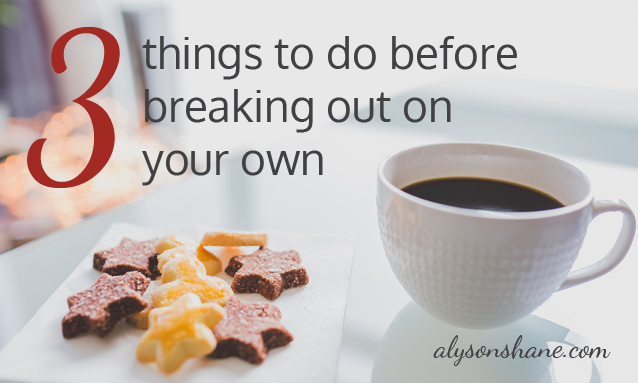
Why do I want to talk about this stuff? Because sharing is caring, and because I was lucky enough to have a wonderful and very clever guide (my boyfriend, John) who helped me navigate a lot of hurdles and helped me prepare for this experience.
Not everyone starting their own business is fortunate enough to have a John in their life, so here are a few things he taught me which I think will help you out if you think that running your own business is the path that you want to take:
1. Start Hustling Early
I got my first client a full year before I started working for myself full-time. Honestly, it happened by accident (I met a guy I knew from Twitter at a party who introduced me to his friend who needed a copywriter) and it wasn't for much, just a few copywriting articles each month. It didn't make a lot of money off that first client, but the experience of working with someone for a while helped me start to understand the dynamic of different kinds of working relationships which were different than the boss/employee relationship I was used to.
Also, starting small has allowed me to scale my business in a manageable way. I've acquired a handful of regular clients who I work with on a monthly basis, as well as some copywriting work, and one-off contracts for special events or websites as they come up.
I should also point out that I have been extremely lucky. What happened to me isn't always the case, and it's not realistic to assume that just because you go into business for yourself, that clients will start pouring out of the woodwork right away.
Not just that, but securing an ongoing contract (if that's what you're looking for, some businesses operate on a per-contract basis) often takes time. The process from the initial email or meeting to signing a contract can take months to happen, or never materialize at all.
By starting to build a client base early, you can get a feel for whether or not running your own business is actually what you want to do before you jump feet-first into doing it. Also, leaving your secure 9-5 knowing that you already have a handful of contracts to take care of your living expenses goes a long way in helping make the transition less scary. Trust me on this one.
2. Buckle Down
Assuming that you're working a 9-5 job in addition to building your business, you're going to be insanely busy trying to juggle both before breaking out on your own. Get used to it.

Before I left my office job I was working most weeknight evenings from 6-11 or 12, and spending a lot of time working on the weekends, as well. If you're trying to build up a decent client base to help you make a smooth transition, then obviously any time spent doing that work needs to be done outside of regular office hours (unless your boss is cool with this, which most aren't.)
If you want to work for yourself, you need to get ready for a very imbalanced work/life lifestyle for a while. Not just before you leave your 9-5, but afterward, too. To illustrate: I'm writing this on a Sunday evening, after working all day since I got up. I've also been on "holiday" since Christmas Eve, but have spent at least 5 days of my 10-day 'holiday' working for the majority of the day (who told you that running your own business was glamorous?)
What's crazy is that what I just illustrated isn't that uncommon; lots of people I know work even more than I do! But when you run your own business you're the only person responsible for generating your own income, and the sooner you get used to working aggressive and unusual hours, the better.
3. Save Up
Without a doubt the most terrifying thing about working for yourself is the transition from going to having a regular paycheque which is deposited into your bank account every two weeks, to one where your financial situation is in a state of flux.
I try not to talk too much about my financial situation, but in the interest of learning from my experience, here's how I managed to get myself into a relatively good position:
When I got my first contract (the small copywriting one I mentioned earlier) I used it to start paying down my credit card debt and the student debt that I'd acquired while in university. As I picked up more clients and started to think more seriously about running my own business as an option, I started splitting my additional income (ie: the money I was making above what I was paid at my office job) between paying down my debt and putting it aside in a nest egg.
Having a nest egg allows me to not freak the hell out when a payment is late (which happens) because I still have a float to live on for a while. Honestly, this "float" is the key to running your own business and not being in a constant state of panic. This all changes when you start bringing subcontractors and employees into the mix, of course, because they have to be paid before you do, but that's a whole different kettle of fish (and anxiety) that we won't go into here.
One last thing about money: get your taxes in order. If you live in Canada and you run a business making over $30,000/yr you must register for a General Sales Tax (GST) number. Dealing with the Canada Revenue Agency is a hassle (believe me) but if you aren't filing your taxes correctly you can wind up owing tens of thousands of dollars. Speak to your bank or accountant, if you've got one, and make sure you're covered.
Do you have any tips for people thinking about breaking out on their own? Tell me in the comments!
How to Create an Eye-Catching Media Kit
- by Alyson Shane
One of the easiest ways to set yourself apart from your competition and impress prospective clients and customers is by having a strong media kit.
A media kit is essentially a tszujed-up version of a traditional resume, except without all the boring stuff. Instead of a lame-looking page listing some roles you had at old jobs, a media kit is a way for you to present what your brand is all about. It's designed to share your story, your services, how you help your customers and clients, samples of your work, testimonials, and businesses you've helped succeed or collaborated with.
In this post, I'll walk you through an in-depth explanation of what a media kit is, why you should use one, and how you can create one that helps your brand stand out from the rest.
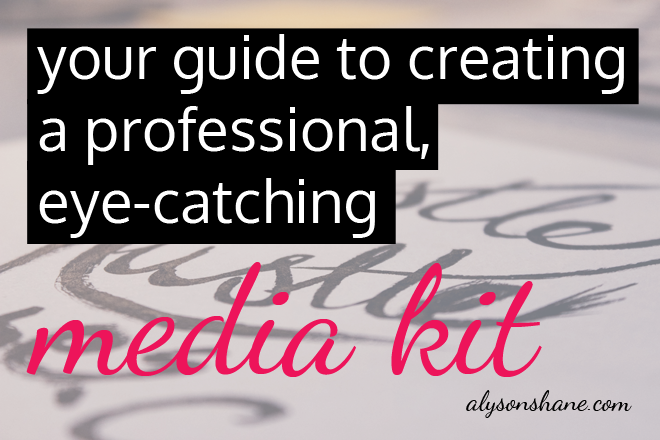
What is a Media Kit?
A media kit is a collection of information about your brand which helps potential customers and clients understand who your brand is, what you do, and what makes you different than your competitors. A media kit can come in variety of flavours, but since I use (and have experience creating) print PDF media kits, this style is the one that I'll focus on in this post.
Basically a PDF media kit looks little a booklet, with a cover page, index (if necessary), and sections breaking dedicated to different topics. The core of your PDF media kit should be a description of your brand and your values, bios of you and your team (if you have a team), your services, and some supporting stuff (testimonials, case studies, etc) that backs up how awesome the rest of your media kit says you are.
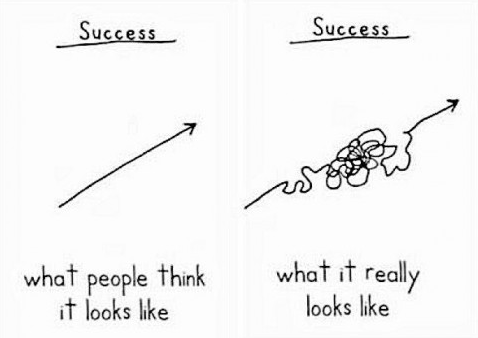
Why Do You Need a Media Kit?
A media kit makes you seem more professional. The fact that you've clearly put the time and effort into producing something which effectively conveys your brand, your values, and what you do shows that you've actually thought this shit out.
The idea of a good media kit is that it introduces your brand better than you can. Unless you're a master speaker who carries a Keynote presentation around in your pocket, a PDF with choice words and eye-catching visuals can easily summarize what you do and give potential clients an overview of your company much easier than you can.
Creating an Eye-Catching Media Kit
How your media kit looks is just as important as what's inside. If your media kit looks like you printed it out at a Staples using the black and white printer on the way to the meeting, nobody's going to take you seriously.
Here are some things to keep in mind to create a concise, clever, and cute (okay, maybe not cute but I like alliterations) media kit which will blow your competition out of the water:
- Avoid blocks of text whenever possible - bullet points are your friend!
- Keep it short. 3-10 pages is ideal for keeping someone's attention.
- Be consistent. Use the same colours, font and branding that's on your website and business cards.
- Don't use more than two fonts. If you can match them to the ones on your website/cards, even better.
- Use images whenever possible; people's eyes start to glaze over and this helps break things up.
- Never misrepresent information or work you've done.
- Update it as necessary. Taking the time to keep it updated shows you're serious about acquiring new business.
What to Include in Your Media Kit
Basically you want to start with the most basic information as possible, and build on it from there to things which get more specific and particular to your industry. Below is a rough outline of the things that you should include, or should consider including, in your media kit.
Remember, these are unique packages which should convey who you are. If any of these things below seem weird, or not like a fit with your business or how you want to present yourself, then feel free to nix them as needed.
1. Who You Are
This section is designed to, obviously, introduce you, your brand, and your team. It should include:
- Your logo and branding.
- An About section. Introduce your brand, how it got started, your primary market, and what motivates you to do the work that you do.
- 'Who I Am' or 'Meet the Team' section with head shots and short bios. Bios can include experience, skills, knowledge, and what each team member contributes, if needed.
- Your target market. Take a moment to describe the kinds of businesses and brands you work with, and in which fields.
2. Your Services
This section is pretty straightforward. List the kinds of services you offer, and provide examples if possible. What's great about this section is that it allows you to define what you want to do, not the other way around. This is how a media kit is different on a resume: on a resume you're basically trying to state a variety of stuff you think people will want to hire you for, whereas a media kit, though intended for the same purpose, doesn't require you to offer up a service you don't want to do, or aren't skilled at doing.
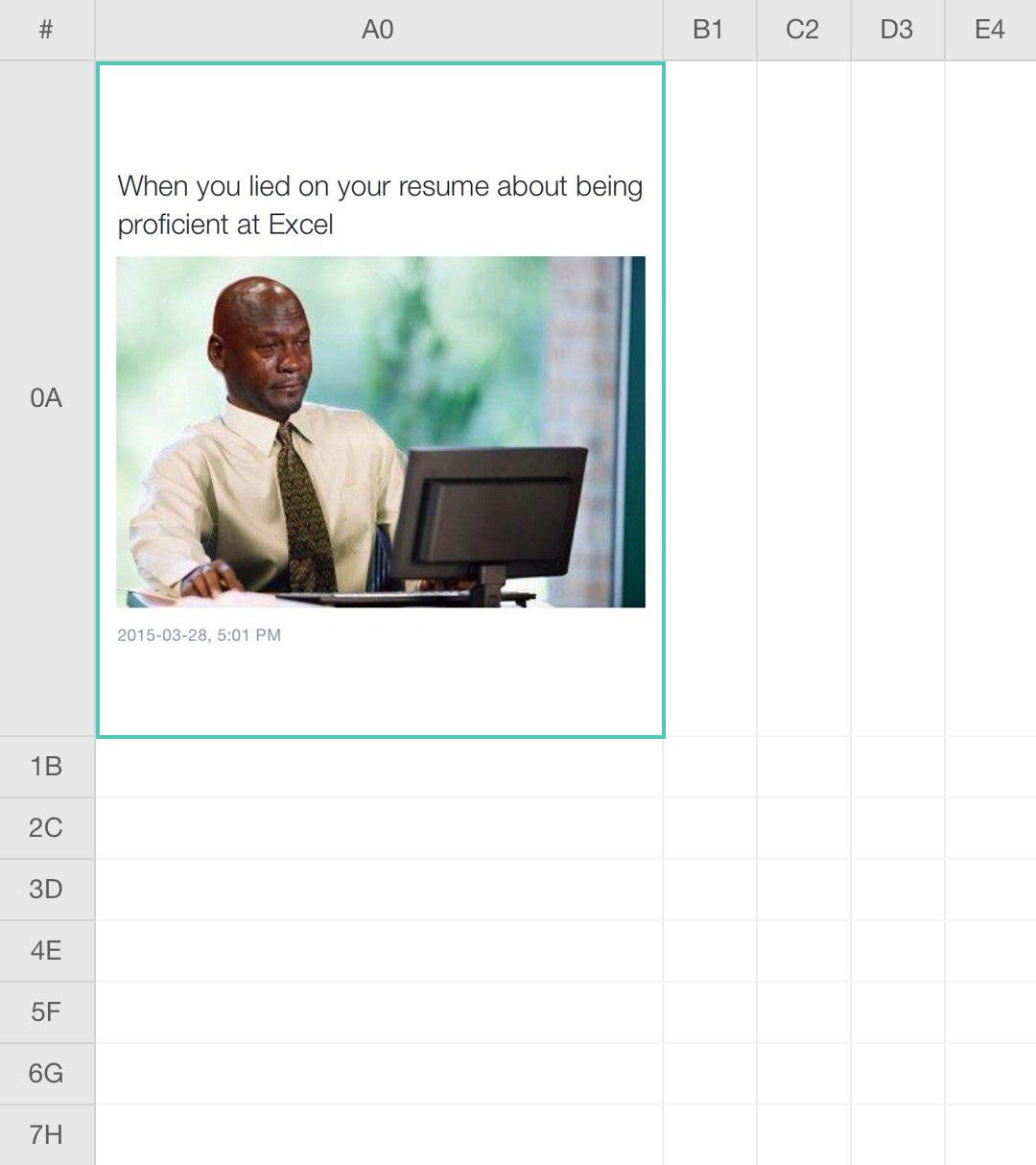
Below is a copy/paste from the Work With Me section on my website. Basically my media kit has a similar iteration to this:
Some Ways That I Can Help You
I'll start by asking questions and help you figure out:
- Who and where are your audience?
- What are their needs and how can you help fulfill them?
- What is your brand message?
- How can we convey this clearly and simply across multiple online platforms?
- Which platforms will help you create a community around your brand?
3. Pricing
This is totally optional.
If your pricing varies from project to project (as mine does) then it may not be advantageous to include a pricing sheet. Personally, because of the amount of setup and customization involved with managing a content strategy across a variety of platforms, I prefer to quote projects on an individual basis.
However, if you're comfortable with sharing your rates from the get-go, or do work which can be easily billed hourly (like graphic design, for example), feel free to include this section in your media kit.
4. Portfolio
If you've been in business for a while, it's often helpful to include other examples of work you've done for past or current clients. This can include case studies, examples of work you've done, or even a list of logos from brands and businesses who have worked with you in the past.
Photographs work wonders in this section, so if you're able to show examples of what you do in screenshots, beautiful images, or in infographs, this is the place to showcase it.

5. Accomplishments
This is also the area where you can share other successes and accomplishments which give your brand more credibility. Some good examples of accomplishments to include are:
- Conferences who have invited you to speak
- Interviews you've done
- Articles published about you
- Websites or sources who have republished, re-shared, or references your work
- Awards you may have received
- etc
6. Testimonials
This goes without saying, but having a strong testimonial's page can go a long way to adding to your credibility. A testimonial from a customer is basically them saying: this person/brand did a good enough job on the work they did you us that I'll put my name behind supporting them in their future endeavours.
7. Policies
This is another area which you can either include, or not. Conventional wisdom (aka a lot of sites I looked at back when I was building my media kit) suggest it, but to be honest I don't prefer to get into stuff like specific policies until a prospective client and I are ready to sign a contract.
This is just personal preference, but bringing legalese and policies in at a very early stage doesn't give me the warm fuzzies about working with someone. I prefer to discuss things first, and then finalize them in the contract before we begin working. Again, this is just personal preference!
Make it Personal
The most important thing about your media kit is you. The whole purpose of this lovely, slightly stress-inducing to create little package is to convey you and your brand in all you glory, so make sure to include a little bit of sass or personality in there somewhere. People want to feel like they're putting their faith (and funds!) in real, down-to-earth professional people, not weird robots who take themselves too seriously.
Media Kit Template Resources
I created a custom media kit for myself using Pages, but if you're not a super-creative type, or the idea of dragging boxes around and aligning text sounds dreadful, check out a few websites offering inexpensive (or free!), trendy AF media kit templates:
- Turner Media Kit Template via HipMediaKits
- Media Kit Template via FoodBloggersCentral
- Media Kit Template via LifeYourWay
- The Minimalist Media Kit via ZaniFest
- The Brand Magnet Media Kit Template
Was this instructional helpful? Let me know me in the comments!
5 Things to Let Go of in 2016
- by Alyson Shane
Okay, I know how cheesy these posts are, but bear with me!
I've had a transformational 2015: I started running my business full-time; I started a second business (more on that soon!); I was awarded a TechFutures Grant; I met so many amazing people and had experiences that the Alyson of 2014 wouldn't have had the guts or ambition to go after.
I also know that there will be tough years ahead, sometime in the nebulous, unknown future, which is why it's important to reflect and consider the things to improve on, and the things to let go of.
With that in mind, I'd like to share my reflections some of this stuff with you guys:

1. Let go of everyone's opinions of your life
There are always going to be people who are going to give you their opinion of how you should be living your life, and that's okay. However, you need to keep in mind that there's no one "right" way to live, and that happiness can mean a variety of things for a variety of people.
Unfortunately this means that you can't please everyone. Your definition of a successful and happy life may be drastically different than someone else's, and they may not be afraid to loudly tell you so. This can get discouraging, and in my experience often leads to self-doubt, and in extreme cases to indecision and stagnation instead of progress. This is because when you spend all your time defending your decisions to other people, you stop focusing on making the best choices.
Ask yourself: what kind of life do you want to have? Do you want a traditional 9-5 with a cute house and a lovely spouse? Do you want to jet set across the globe, live in hostels and take a series of lovers? Maybe you want to do something else - that's okay! What matters is defining what your ideal lifestyle looks like, and then taking steps to achieve it, no matter what anyone else thinks.
2. Let go of your comfort zone
A few weeks ago I spent the day at InnovateMB's Pitch'Day workshop and - full disclosure - initially I did not want to go. Not because I didn't think the workshop wouldn't be super-helpful (and it was!) it's because the idea of having to sit by myself in a room full of my peers and present, discuss, and analyze my business idea scared the living daylights out of me.
However, after a cup of coffee I pretty quickly found a better attitude and wound up learning a ton - way more than if I had held on to my discomfort. Instead, I made a point to actively participate, ask questions from the presenter and engage as much as possible, and I wound up having an excellent time!
Not just that, but pushing myself that way felt good. Even when I got something wrong, or made a mistake, I could let myself off the hook because at least I got over myself (and my fear of being wrong) and made an effort.
This is of course easier than done in a lot of cases, but taking baby steps like asking a question, going out to a meetup where you don't know anyone, or even taking yourself out for lunch can make a huge difference in how you feel about yourself!
3. Let go of 'Zero Days'
I read a great post on Reddit yesterday which discussed being motivated and staying positive, and one of the things they mentioned was not allowing yourself to have 'Zero Days'. A Zero Day, according to /u/ryans01, is "[a] day is when you don't do a single fucking thing towards whatever dream or goal or want or whatever that you got going on."
Look, I hear you: "Alyson, asking me to never take a day off is ridiculous!" Which is true. Good on you for recognizing that over-working yourself is counter-productive!
However, taking baby steps each day towards your goals is a totally within reach! Here are a few examples of things I do so that I don't have Zero Days:
- Write blog posts/sketch out content ideas
- Work on the Crowdfunding Crash Course eBook, Puffin Chat, and other side projects
- Read articles about my industry and the tech sector
- Queue up content for my/client's social feeds
- Go to the gym and work out
- Clean and listen to podcasts (I find a clean house helps me think & focus)
- Draw or doodle in my sketchbook
Notice that all of these things are pretty low-key and don't really seem that taxing, which is the beauty of it. All of these things, if done consistently over time, will help me work towards my goals (being creative, moving my business forward, staying in shape, working on my art, etc) and if I look at them as small things to do each day they feel a lot more manageable.
Full disclosure: I still have zero days. Usually they look like days where we lie around on the couch, order some SkiptheDishes (I'm hooked) and binge-watch a TV show (we just finished Jessica Jones - so good!) but they are few and far between, and are getting further and further apart.
4. Let go of the people who don't add value
This is the one of hardest things.
It's so easy to let people over-stay their welcomes in our lives. Whether it's an old lover who doesn't ignite your heart like they used to, or an old friend who doesn't zhuj up up your days, sometimes we let people who should have parted ways with us stay around too long. Sometimes (too often) we even fight to keep them in our lives because they've become familiar and comfortable.
But it's important to do our best to consistently re-evaluate the people we devote our time and energy to. Like the old adage goes, we are the sum-total the the five people we spend the most time with.
Ask yourself: how do I feel around these people? What do we talk about - are they generally negative, or positive topics? Do these people make me feel small and insecure, or unafraid and bold? These are important questions to ask on a regular basis, and if someone starts to fall into the negative category for too long, it's time to have a chat about it, and potentially move on.
5. Let go of the idea that you can't change things
You can always change. If there's anything that the past few years have taught me, it's that a few small changes, or a little bit of belief in yourself can make a world of difference.
The problem with looking towards the future is that the future feels overwhelming. So instead, try to take baby steps (see Zero Days above) which help you work towards your goals at a pace that feels comfortable. Here's a personal example:
When I was 21 worked a safe government accounting job, but I was unhappy and wanted to go to university. However, quitting my job was scary and I didn't know if it was the right choice. I hummed and hawed for weeks about what my next steps should be. I felt overwhelmed at the transition from full-time employee to full-time student, and how to get started. However, I knew how, deep down: I needed to call Student Central at the university and book an appointment to speak to someone about pursuing the degree I wanted.
It was so easy to find reasons not to call and speak to someone about applying: I went out on my lunch break and there was no time; I felt too busy and overwhelmed from my workday to deal with it; and, most commonly "I just don't feel like it today." One day, though, I picked up the phone and did it. I spoke to someone, got the information that I needed, and after I hung up the phone I distinctly remember saying to myself "wow, that was so much easier than I'd made it out to be."
Spoiler alert: most things are easier than we thought they'd be. It's just a matter of looking at things as small steps towards a larger goal, instead of huge, overwhelming obstacles. Chip away at it slowly and you can move a whole mountain, if you try!
What are you letting go of in 2016? Tell me in the comments!
How to Work From Home & Not Go Crazy
- by Alyson Shane
Last week, after nearly 6 months of working from home, it finally happened: I got lonely. Not just any kind of lonely, though, this was "it's Tuesday and I haven't left the house or talked to the outside world since Sunday" kind of lonely. I started to feel anxious, crazy, and totally disconnected from the outside world.
As someone who has worked in an office for the majority of their adult life, working from home has taken some getting used to. Don't get me wrong, the perks are endless: I can wake up when I want, I can go for lunch or coffee with a colleague and not worry about being back "in time", and I can plan my workdays around when I'm my most productive and not when a boss expects me to be.
However, it does get super lonely. Hanging around the house all day with these two weirdos is awesome, but it's weird how much you begin to miss that water cooler chit-chat, and how much effort actually has to go into making sure you don't drive yourself stir-crazy.

Get Dressed
Getting dressed is the difference between a "lazy Saturday in front of my laptop" and "I'm getting actual work done" mode. it might sound crazy, but stick with me here, there's some important reasons why this is actually a helpful and totally legitimate practice:
Clothes are symbolic, and affect how we feel about ourselves. When you put in the time to make yourself look nice you're more motivated to "get out there" and hustle, whether that means meeting a client, going somewhere, or even talking on the phone. In addition to that, getting dressed helps subconsciously compartmentalize areas of your life that can begin to blend together when you work from home.
Besides the mental difference between hanging out in your PJs and getting dressed, being fully dressed and ready to head out the door means that you can do exactly that - I can pop out to the store, to grab a coffee, or to go sit somewhere and work if I feel like it.
Personal aside: I have "power lipstick" that I put on before an important client call. I know it's silly, but wearing it makes me feel like a bombshell badass à la Meryl Streep in The Devil Wears Prada and definitely makes me feel more powerful and assertive.
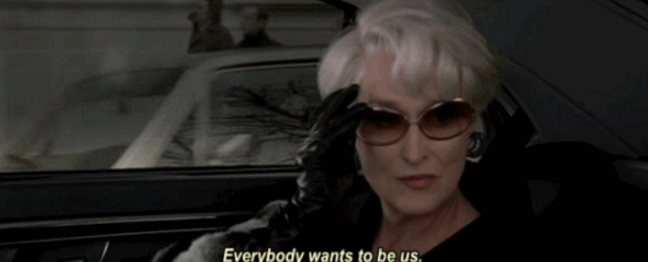
Keep Your Work Area Separate
Disengaging from work mode into relaxing mode is way harder when you do both in the same space.
Currently I do all of my "office" work at my iMac, at a desk, in a computer chair, and try to relegate "downtime" (aka hanging out on social networks, reading for leisure, and writing) to sitting on the couch with my Macbook. Sometimes these lines blur - I'll work on my eBook from the couch, or write a blog post at my desk (like I'm doing now) by and large my 9-5 type work takes place at a separate area than my leisure time.
My guess is that it's a mental thing, but sitting on my super-comfortable couch with my feet up makes me feel less like I'm working... so I work less. I spend way more time slacking off if I try to work from the couch than if I'm art my desk. Additionally, I can "leave work" for the day by putting my iMac to sleep and shutting off my desk lamp - those are symbolic gestures that, for me, signal the end of my workday and a transition to hanging out and relaxing.
Figure Out When You're Most Productive
One of the biggest changes from going to working in an office to working at home is that you don't have to worry about being "on" all the time. What I mean by that is, you don't have to worry about looking busy 24/7 just in case your boss happens to walk by and see your screen. According to a salary.com article from 2014, 89% of employees say they "waste time" at work - whether that's checking their email, hanging out on Facebook, or loitering around the coffee machine; they're not sitting at their desks and being productive.
But what does "productivity" mean? For most employers, it means that you're plugging away at a task and that you're operating at the highest efficiency levels from the moment you arrive to the moment you leave the office. Realtalk: this just isn't the reality, and sitting at your desk and forcing yourself to try and operate at maximum efficiency all day is a surefire way to get next to nothing done.
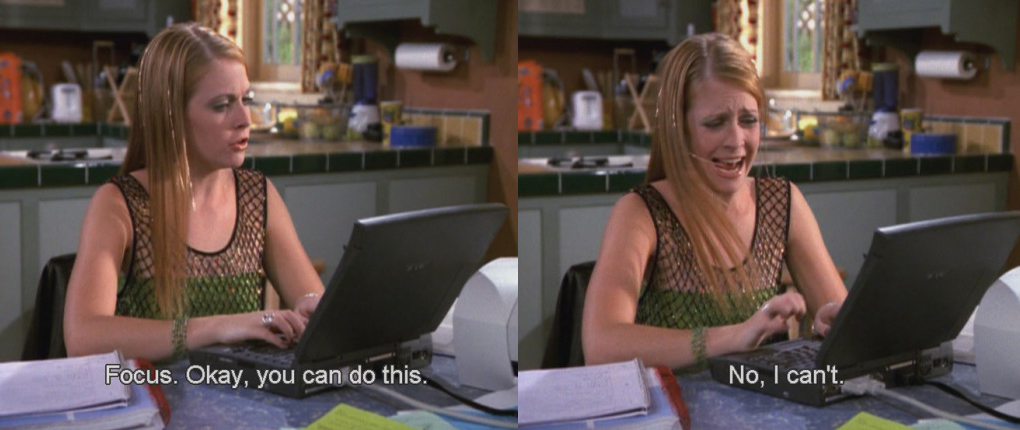
One of the great things about working from home is that you can set your own schedule according to when you're most productive, rather than trying to be productive all day (which rarely happens with any real level of consistency - we all need breaks, after all).
I know that I'm most productive early in the morning (8-11ish) and late in the afternoon (3-6ish), with a lull in-between most days, so I tackle my most pressing and important tasks during those two times - usually I try to handle client stuff in the AM, and do business development stuff (blogging, writing my ebook, etc) in the afternoon. That way I know I can get the most out of my day, and by having a little downtime I can make sure when I'm productive I'm as focused as possible.
Declutter Your Desk
Clutter is the enemy of productivity, and if you have to spend a ton of time searching through papers, looking for a pen that works, or rooting through old notes and files you're distracting yourself from what you should actually be focusing on: being productive.
I'm a bit of a cleanliness nut, so here's how I keep my desk organized and in a state of zen during the week:
- I only use one pen at a time. Actually, I rely pretty heavily on mechanical pencils, but I have a little box that I got from Magic Pony several years ago where all my pens and pencils live.
- Do a paper purge. I try to keep my desk as paper-free as possible, which means rounding up notes, papers, and receipts and putting them away. Additionally, if you want to claim something on a receipt as a business expense take a photo before you put it away. I do this weekly and it saves me so much hassle.
- Purge your desktop. Put unused files or photos in the trash bin and try to keep your computer desktop as clutter-free as possible. I generally only have my notebook, a pencil, and my phone on my desk when I'm working.
Find Reasons to Leave the House
This is a huge one, kids. It's way too easy to wake up, work, hang out, go to sleep, wake up, work, hang out, go to sleep, wake up... you get my drift. Especially during the winter months when sitting outside on the deck isn't an option it can be all too easy to wind up staying inside for days at a time, ordering all your meals in from SkiptheDishes and being glued to the computer screen.
Personally, I combat this by hitting the gym on a regular basis, which gets me out of the house, on the bus, and interacting with other human beings 3-4 times a week. Usually I'll stop by the grocery store on the way home for a little more face time with people aren't my boyfriend or my roommate or his girlfriend.
Don't Work in Bed
This should be self-explanatory, but just in case: don't bring your work into the same place where you sleep and snuggle up with your lover.
Do you have any tips for staying sane while working from home? I'd love to hear them!
Why My Autumn Mantra is "Less Is More"
- by Alyson Shane
It's been a whirlwind few weeks and somehow a few days ago I woke up and it was already September. How the heck did that happen?! I feel like I blinked and already I'm transitioning to warmer drinks, longer sleeves, and yellowing leaves.
Anyway, this is generally the time of year when businesses begin to really kick things into high gear - everyone is coming back from the cottage, the lake, or an extended vacation, and are starting to plan the big push for the fall/winter season. With that comes a slew of work, usually in the form of new projects, tasks, meetings, conferences, Skype calls, phone calls, coffee dates, you name it.
With all this is can be difficult not to get too caught up in the minutiae of everything. It can be hard not to become overwhelmed, but it can also become increasingly difficult to stay focused and streamlined.
Which is why my autumn mantra is "less is more."

What does that mean?
What I mean is this: more information doesn't mean better information.
However, when you're a business owner it can be easy to get lost in all the details. You start to feel the need to communicate every thought, idea, brainstorm, detail, etc with everyone involved in your project, which can actually waste time and cause miscommunications, which set you even further back from your original goals.
This is because we're often led to believe that including every single detail, or poring over something exhaustively, or even outlining things in crazy detail is the best way to convey what we have to say.
- Facts are what matter. That the right information stated in a clear and concise manner will get people to act and agree.
- Everyone wants all the details.
- People will pay attention because they know that they should. They will read the entirety of your email, pay attention to every detail of your phone call or meeting... you get the idea.
- People will take the time to learn something properly.
If there's one thing that I've learned in the past while it's that none of these things are true.
Here's what's actually true:
- People make decisions based largely on what they feel, regardless of what the facts are.
- People will gloss over details. Be ready (and willing) to repeat them.
- People only pay attention to what matters to them. If your email is too long, they'll skim it; if your meeting lasts a while, they won't remember every detail.
- People will half-ass most things unless it is required of them.
This is in no way a slag against anyone - this is just how we are. We only give 100% of our attention to things that we're emotionally and presently invested in, which usually isn't your email (it's probably what they're doing this weekend, or that funny gif they saw).
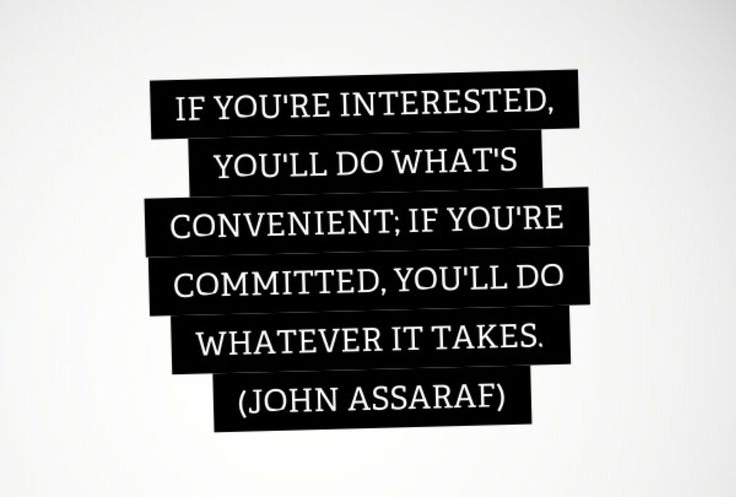
Okay, but why does this matter? I hear you asking.
What can you do?
Here are some steps you can take (and that I'm trying to take) to get around these issues:
Say the important stuff at the beginning of your email. Guys, I struggle with this one so hard, but it's true: put the important stuff at the beginning of your email or it'll never get read.
Send follow-up emails after a meeting. Sure, you took notes, the other people in attendance took notes... but are they all the same? Do they all outline the same goals, objectives and responsibilities? You have no way of knowing, so send a quick summary email detailing the meeting. That way you can clear up any miscommunications and potentially save yourself some hassle down the line.
Break longer emails down into easily readable chunks. If you have to write out a longer email, use bold text to indicate new sections, and try to break things down into lists if possible. If someone opens your email and is greeted with a wall of text they're less likely to spend the time to read the whole thing.
What does this mean for your audience?
If we think about our content strategy with the same focus -namely, that people have limited attention spans and only pay attention to things that interest them- we can start to draw some conclusions which we can apply to the kind of information that we share.
Let's look at a few questions we can ask ourselves:
- What can you tell your audience (besides facts) which will mean something to them?
- Which important details can you focus on to get your point across?
- How can you share content in an original and engaging way to get people interested?
- How can you lead people to the same conclusions or end-goals as you?
By twisting the perspective around and thinking about how you can share more with less, you begin to ask questions which put you in your audience's shoes (spoiler alert: this helps you be better at what you do!)
Awesome! Now what?
Now you can start to apply your new mantra to everything you do! Use the "less is more" mantra to send better emails, have less lengthy and time-consuming meetings and follow-ups, and convey yourself better to your colleagues, clients, and your community.
Got questions? I've got answers! Leave your queries in the comments, tweet at me, or send me an email to continue the conversation!
Live Your Daydream: How to Make a Living Doing What You Love
- by Alyson Shane
Things are starting to ramp up over here at Shaner HQ and lately it seems like I've been getting inundated with people asking me for advice on how to make the leap from boring office job to the exciting (and mildly terrifying) world of running your own business.
While I love talking to everyone individually (I'm a huge chatterbox) it seems like a lot of the same questions keep coming up: how can you figure out what to do? How can you get from 9-5 to full-time business owner? What are the challenges along the way? and so on.
So it seems best to address them in the best way I know how: a blog post, of course!
This isn't going to be a bubblegum session where we talk about the magical dream that is running your own business (though it is pretty kickass); today I want to talk to you about the real-life things that you need to do to start doing what you love for a living.

Figure out what you want to do
So you've got a full-time job that doesn't excite you and you know that you want to run your own business instead, but where the heck do you start? First, figure out the thing that excites you the most and focus as much of your time and energy on learning as much about it as you can.
Maybe you love writing and want to be a copywriter, maybe you love building websites and want to help people build websites for their businesses, or maybe you love knitting awesome sweaters for your cat. Who knows. What matters is that you love doing it, it excites you, and you're dedicated to turning that passion into your livelihood.
The best (and safest) way to start working towards your goal of being a full-time businessperson is to start small. Spend a few hours a week honing your craft, reach out and try to get to know influencers and other people who might be able to help you, find a mentor if possible, and try to gather a small roster of clients.
By having a few clients on the side you can safely get a taste for what your full-time work will be like, start to understand the ins and outs of client relationships, and spend some time thinking long and hard about whether or not these experiences are indicative of the kind of lifestyle that you want to have.
Start to plan
So you've spent some time learning, testing the waters, and have decided to make the plunge into the crazy world of running your own business. Good for you! But before you go quitting your 9-5 all willy-nilly, you need get your ducks in a row first.
Take a step back from your life and look critically at where you are: where are you working? Do you like where you work, and how long are you planning to work there? Do you have any debt, and what are your goals for paying it off? What are your basic costs of living? You get the idea.
Next, sit down and prioritize your goals. For me, my biggest goal was to have as much of my Visa and my student debt paid off before I quit as possible. I made the decision to leave my job in December of 2014, and I spent the next several months working full-time, collecting clients on the side, and using the money that I was making as a freelancer to aggressively pay off my debt. Being able to tackle this huge weight gave me some breathing room when I finally started running my business full-time, and I wish I could go back in time and high-five my past self for being so forward-thinking. I really did myself a solid.
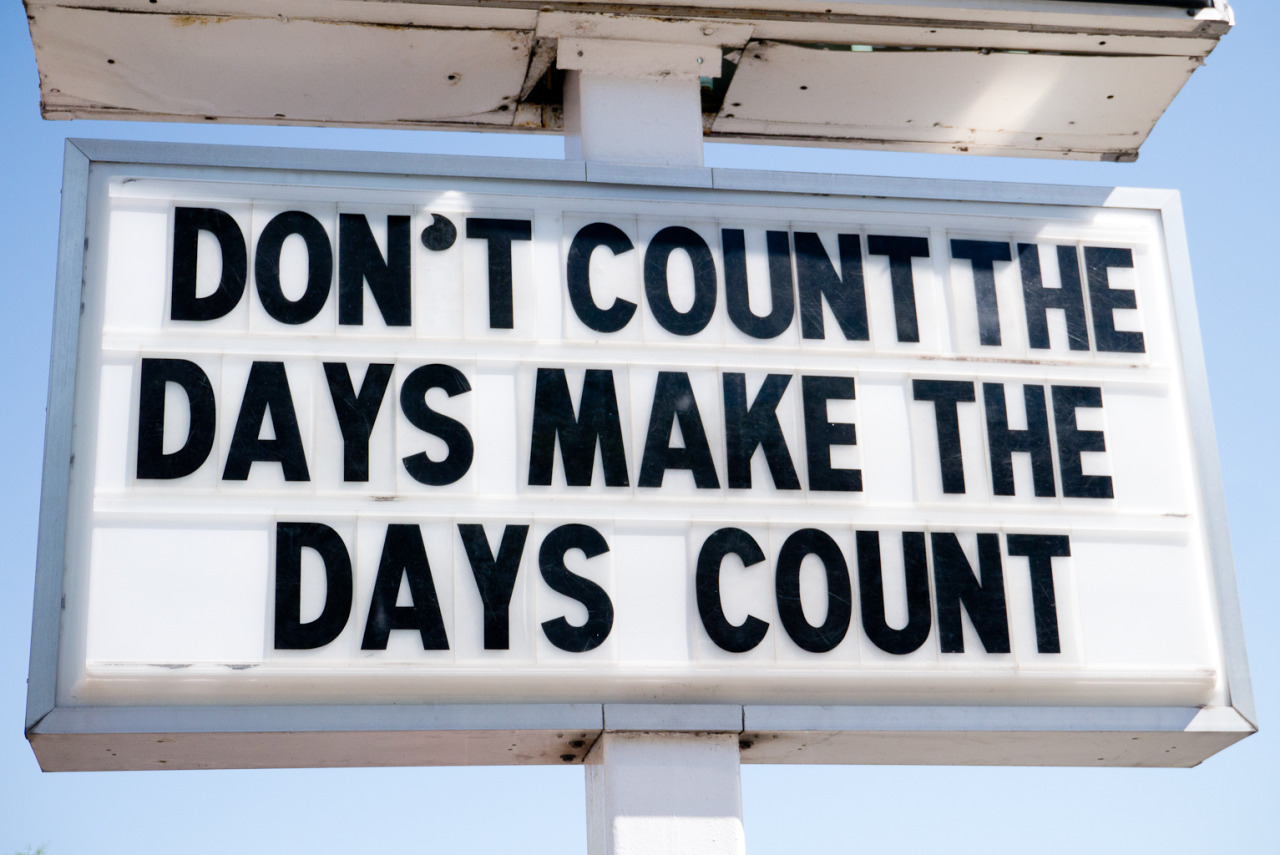
So is there something that you'd like to accomplish, or start doing before you start running your own business? It doesn't have to be debt-related; it could be anything from taking that amazing trip, to buying that new laptop, to meeting with a financial advisor. Whatever it is, do your best to do it before you go solo, because you're going to want to hit the ground running.
Now is also the time to start thinking about the details of your business. By having a deep and thought-out understanding of who you are, what you offer, and the kind of business you want to run before you get going full-time will save you a lot of hassle down the line, and will help you stay laser-focused on your goals.
Some questions to ask yourself are:
- What specific services will I offer?
- What is my ideal number of clients?
- How much will I charge for my services?
- What kinds of contracts do I want to have (eg: recurring, one-time, etc)
- What is the basic monthly income that I need in order to survive?
- How will I find new clients? (eg: blogging, online promotion, Meetups, etc)
- How much money can I save before I quit, and how much runway* will that give me?
*Runway refers to the length of time that your business can exist without collecting any additional sources of income. So, if your client pool dries up, how long until you need to go back to a 9-5.
You get the idea. There are tons of other questions that you'll need to ask yourself that are more specific to your circumstances, but these should get you started.
Treat your goals like recipes
What I mean by this is do everything one step at a time. It can be totally overwhelming to look at all the things that you want to do, or that need to get done, and start to freak out internally because how the hell are you ever going to accomplish all that? By breaking it down, that's how.
Think about your biggest goal and write them down. What do they look like? Do you want to quit your office job by 2016? Be on the cover of your local paper? Land that dream client you've always hoped to work with? Write it all down in as much detail as you can think of.
Now that you've written it down, plot out all the steps that you need to take to achieve that goal and say them out loud as you write them. It sounds cheesy (I know) but it absolutely works. Seeing the words on the page and hearing your own voice saying them helps make those steps seem more real and attainable.
Now that you've set out your goals and broken them down into smaller, attainable steps, it's time to start chipping away at them.
Don't freak out when your plan goes awry
Remember how I said that I had those lofty goals of paying off all my debt before I became a full-time businesswoman? Yeah, that didn't happen. I've made a significant dent, but to quote John Steinbeck: "the best laid plans of mice and men often go awry", and things came to a head at my old job and I had to make an exit before I totally lost my mind. It was a bit sooner than I'd anticipated (by a few months) but by planning ahead and actively working towards this goal for several months beforehand I was in a much better position to start kicking ass and taking names right away.
Remember: just because your plan didn't execute perfectly doesn't mean you fucked up. It means you're human, and it just means that you have one more challenge to face (and overcome!) on your road to independent businessperson fabulousness. Do your best to plan what you can as far in advance as you're able, and when life tosses you a curve ball, you'll be ready to react.
Plan for the best & prepare for the worst.
Be honest with yourself about money
#RealTalk time: running your own business doesn't mean you'll be swimming in giant pools of cash mo-nay immediately. In fact, for most people it takes a long time, sometimes years, to start to really pull in a significant amount of income. Most of us, myself included, take giant pay hits, sacrifice our social lives, travel plans, and long-term goals like home ownership or even having a car because we want our runway to last as long as possible.
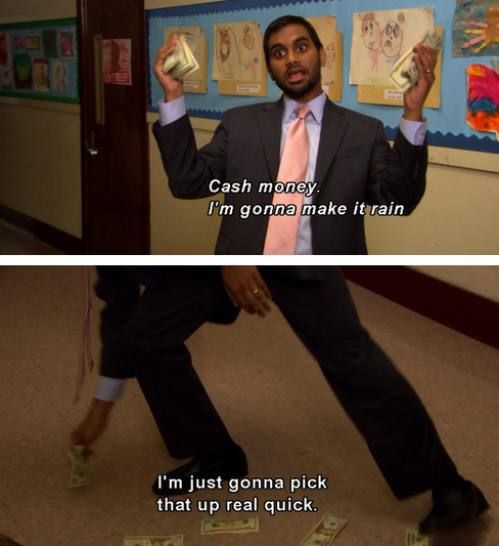
(this is an accurate depiction of what running your own business feels like)
If you've been smart and saving up, or you've got a big cash influx from a contract (or both, if you're lucky) for the love of god don't spend it all at once. I know how good it feels to look at your bank account and see all those dolla bills sitting there, but working for yourself is much more precarious than a 9-5. With a regular job you know you have income coming your way every two weeks (or whatever your pay schedule was) because it was on a schedule, so who cares if you spend a bit extra this weekend - you know exactly when the next influx of cash into your bank account is going to be.
Clients don't usually work that way, and it's not uncommon to wait several weeks for a payment, or for contracts dry up overnight. This is why keeping that runway as topped-up as possible is crucial.
Pound the pavement 24/7
I mean it. When you start running your own business the amount of contact that you need to have with other people (aka "exposure") needs to ramp up significantly. If you weren't active on your own blog, social media feeds, and out and about in your city, it's time to start putting yourself out there.
Believe me when I say this: the amount of work that you put into making sure people know who you are will have significant long-term benefits. It might take some time, but if you can start to develop a positive reputation as being "in the know" about your industry, people will start to defer to you, and eventually will start to refer you to others.
Last year I at one of my speaking engagements I mentioned that I'd been blogging for over a decade, and that experience is what helped me land the role I had at the time. I was speaking to first-year Creative Communications students, and one of them asked "why should I keep my profiles updated when I'm not looking for a new job?" My response to the student was "you never know when an opportunity will find you," and to that I'd like to add that when you run your own business you are always looking for a new job. Ideally you'd like to get yourself to a position where you're turning down work, but until you get there (and if you get there) you need to be as active at promoting yourself and your business as possible.
Ignore the haters
Like the old saying goes: haters gonna hate, and I guarantee you that from the second you mention that you're planning to start your own business there will be someone naysaying the idea right from the get-go. It might be a colleague, friend, family member, whoever. They might put down or dismiss your goals, and will likely do so under the guise of "being concerned" and "caring about your well-being." If anyone in your life says that to you, make a point to respond by saying "if you're concerned about my well-being, then help me achieve this goal because it will make me happy."
Remember: what you're doing takes guts and courage, but it's something that anybody can do if they just work hard enough. There will always be reasons and excuses to not pursue your dreams, and the longer you wait the more you'll begin to sound like everyone else.

Do any of these phrases sound familiar?
"This job is as good as things are going to get."
"I don't have the time"
"I could never make money doing what I love"
"I have too many responsibilities and it's too late now"
I grew up hearing all sorts of BS like that, too. My dad has worked in the same department since his early twenties, my mom never went to college, and growing up I was surrounded by people who simply settled for their lot in life and never tried to push themselves (though man did they ever bemoan their circumstances.) These influences led me to believe that running a business was this unattainable and foolish goal, and something not worth pursuing.
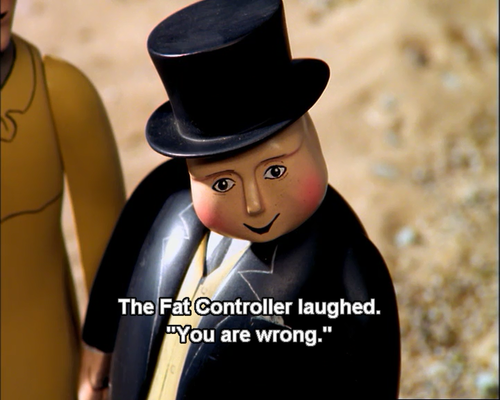
If there's anyone in your life echoing similar sentiments, tell them where to shove it. Life is too short to spend waiting around for the perfect time (which will never come) or trying to please everyone (which will never happen.) Here's a great quote on the matter:
“In every industry, there is an edge. In your business or personal life, it doesn’t matter– somewhere, there is a cliff. Most people don’t want to get to close to it, because they’re afraid they’ll fall off.
Thing is, the edge is where all the cool stuff happens. I know you don’t want to make a decision that is irrevocable and wrong– a decision from which you might never recover– that’s natural.
But guess what?
You are actually in the middle of an open field, inside your house, clutching your purse, crying like a little girl while looking at an edge you see on television.
In other words? You are nowhere near the goddamn edge.
It’s time you stopped being a fucking pussy.”
Julien Smith
Still feeling stuck? Get some help
If the idea of starting your own business is still way too daunting (and that's totally okay!) here are some great resources, articles, and people I'd recommend working with to help set you on the right track:
How to Do What You Love
An amazing article by YCombinator founder and overall genius Paul Graham
Kyla Roma
Business coach & strategist, and totally badass babe (also someone I know personally & adore)
Futurepreneur Canada
Tons of resources for mentors, coaches, funding options, etc (for Canadians)
Miracle Worker
8 week online course by Gala Darling & Ellen Fondiler
Seth Godin's Startup School
A free podcast series by Seth Godin, world-renowned marketing author, thinker and overall clever dude
Moz Learn
Learn everything there is to know about inbound marketing with this series (which I highly recommend)
Still have more questions about running your own business? Want me to expand on any of these topics? Shoot me an email, tweet at me, or let me know in the comments!
Going Solo: Reflections on 31 days of running my business full-time
- by Alyson Shane
Last Saturday, on August 1st, I passed an important personal milestone:
I'd spent 31 days (a whole month) running my own business full-time.
While this might seem insignificant to some people, it's a really big deal for me. As I've said many times on this blog, I never thought I'd be the kind of person who could run their own business. I was raised with the the mantra of "get a job, stay there, keep your head down and work there until you retire," and the idea of working for myself and being the only person in charge of my own future was really, really scary.
So when I sat down at my desk on my first day of work I felt this huge rush of exhilaration: okay, I'm here. I'm actually doing this... holy shit I'm actually doing this.
(I haven't really lost that feeling, yet.)
The last month has been a whirlwind of activity. Meetings, emails, and more work than I'd imagined. Whoever said that running your own business was easy is lying to you. I don't really know what I expected when I started this adventure, but I wanted to share a few things that have stood out to me over the past several weeks because while some of them were totally expected, others really caught me by surprise.
Here's how things have gone:
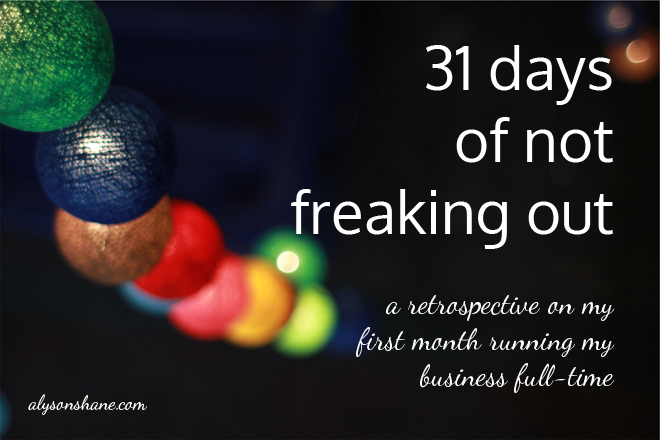
My productivity has skyrocketed
Even though this is my first month running my business full-time, I've actually been running it since June of 2014, taking on contracts in addition to my 9-5. This meant that for over a year I was going and working at my desk job (which wasn't terribly rewarding, and sapped a lot of my creative energy) and then working on client stuff in the evenings.
Spoiler alert: this can be exhausting. There were days where I would literally be working from 9am to 1am the following morning, then getting up to go to work and do it again the next night. It sucked.
Sure, there are days when I'm less productive, those happen to everyone, but overall I can churn out significantly more content for myself and my clients now that my time is 100% committed to doing so. I'm not as tired, I'm not as worn-out, and I actually do what I love to do, which is the largest motivating factor.
Additionally, I think that we pick up a lot of bad habits when we work for someone else. There's a lot of "looking busy" or "killing time" that happens at a traditional office job that simply isn't an option when you work for yourself. I'm the only person in charge of my own time, and I have to be accountable to myself.
On that note...
Taking ownership of my own time has been weird
A few weeks ago I had lunch with Dave Shorr and he said "I do all my grocery shopping on Tuesday mornings. Everyone is at work, and I do in 20 minutes what would take me two hours after work. Then I go home and work all day."
I remember being surprised by how casually he brought this up, but now that I've been in the groove of things for a few weeks I totally see his point: understanding how you can "hack" your schedule to make the most of your time can make a huge difference in your productivity levels.

When we work in a traditional office-type setting our time is never really our own. There's always a boss to report to, someone breathing down your neck who is judging how you spend your time "on the clock," and the possibility that you might be reprimanded for not using it in a way that they feel is acceptable.
Owning my time has been the biggest challenge for me this month. When you grow up learning that someone else is in charge of your time, it can be really weird to take ownership of it and use it in the best way possible.
This isn't to say that I'm less accountable than I used to be - in fact, I have more "bosses" today than I did a month ago -but what's different is that (by and large) clients don't care when you do your work, they just care that it gets done. When you do it is up to you.
My to-do list is my best friend
This was John's big piece of advice for me: every day, or once a week, sit down and write out the things that you need to get done. Check them off when you're finished, and cross the whole page off when it's complete!
Every Monday morning I sit down at my desk and write out my to-do list for the week. I include meetings, emails that need to be dealt with, content that needs to be scheduled, etc. I do this for my client work, but I also include a section of my own personal business development goals as well. Am I meeting someone for lunch? In the checklist. Am I planning to reach out to someone? In the checklist it goes!
Having a concrete reminder of what I need to do helps me stay focused and organized, which is a huge boon because working for (and by) yourself can often feel scattered, and it's very easy to get distracted. Having a physical list to go back to and revisit helps me give a sense of order to my days.
Additionally, my to-do list is ever-evolving. I'm not (and will never be) one of those "inbox zero" kinds of people - I'm constantly adding to it, revising, re-thinking, and trying to figure out ways that I can be more productive in less time.
There's no shame in asking for help
I wouldn't be able to do what I'm doing without the advice and insight that I've been able to glean from a ton of people: John (obviously), Les, Kyla, Andrea, Jodi, Louie - these are all people who have taken the time to talk to me and give me advice on how to run my business, be efficient, reach out to people, you name it.
I grew up being afraid to ask for help. I felt shame in not-knowing, and actually botched a job opportunity in the past because I was too afraid to speak up and say "hey, I need some guidance over here." I let my own pride and guilt get in the way of being successful, and that's something that I've had to quickly learn to get over. No more being afraid of not-knowing. Period!

I can do whatever the hell I want to do
I didn't want the tone of this post to get too self help-y or preachy, but I'd be remiss if I didn't mention that every. single. day. this month has been like a slap in the face, reminding me "you can do it if you try."
I mentioned my upbringing at the beginning of this post, and I don't think that I'm the only one who grew up learning this mentality. Our society teaches us that we need to "play it safe" (whatever that means) and that depending on someone else for our paycheque (and in many cases our sense of self-worth) is safer than depending on ourselves to find the value in our work.
We're taught that it's "too hard" and "too challenging" and that people who try are "so brave" (or, if the person you're talking to is a jerk, "so stupid") for putting themselves out there and giving it a shot; as though being in business for yourself is this unattainable pedestal that only the super-driven or super-lucky can attain.
This past month has taught me that those statements are utter bullshit.
There are always going to be creeps in your life who don't want you to challenge yourself; maybe it's your conservative family, maybe it's a naysaying friend, maybe it's a boss who made you feel like dirt every day (I've dealt with all of those). It doesn't matter. If you want to do it, then go for it.
And if you don't know where to start, shoot me a message. I'm always down to chat.
